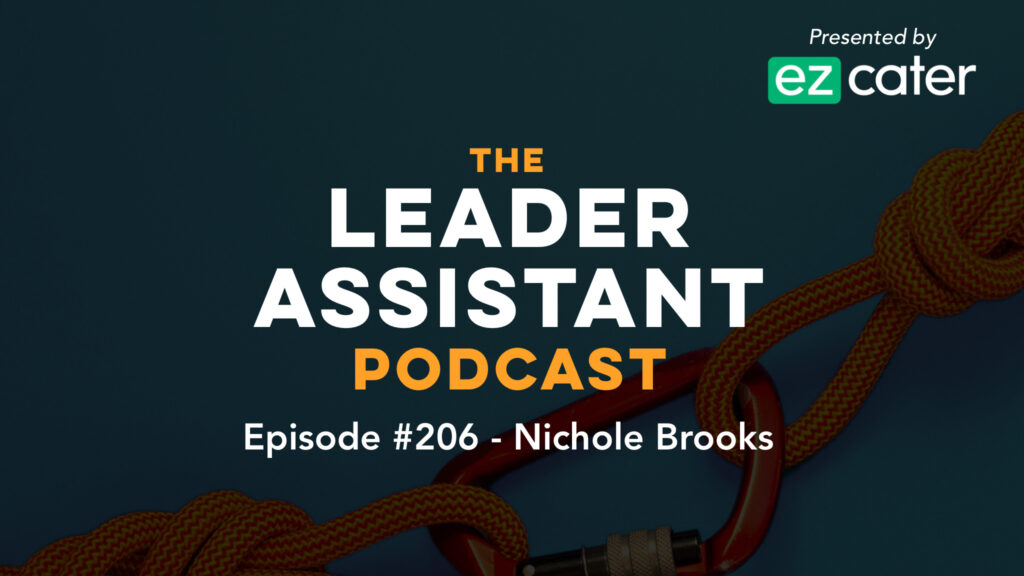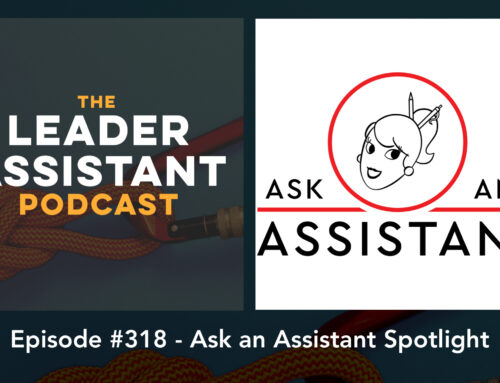Nichole Brooks has an extensive career as an administrative professional with 30 years of experience, including her current role as an Administrative Operations Manager.
In this episode, Nichole discusses advocating for assistants to the leadership team, extending grace at work, transitioning from being a peer to being a manager, and more.
LEADERSHIP QUOTE
Apologizing is a strength, not a weakness.
CONNECT WITH NICHOLE
ABOUT NICHOLE
Nichole Brooks has 30 years of administrative experience in the public, private, manufacturing, and nonprofit sectors. Currently, she partners with exceptional Executive Assistants who provide complex and varied support to all levels of leadership.
–––
THE LEADER ASSISTANT PODCAST IS PRESENTED BY EZCATER
ezCater is the nation’s most trusted provider of corporate food solutions — the best way for companies to order food for daily employee lunches, meetings, and events of any size or budget. ezCater’s simple-to-use platform provides a network of over 100,000 restaurants nationwide, business-grade reliability, food spend management tools, and 24/7 support from their highly trained customer service team.
To explore corporate food solutions or place a catering order, visit ezcater.com.
–––
THE LEADER ASSISTANT PREMIUM MEMBERSHIP
To learn more about how you can join growth-minded Leader Assistants, check out our Leader Assistant Premium Membership for ongoing training, coaching, and community.
THE LEADER ASSISTANT BOOK
Download the first 3 chapters of The Leader Assistant: Four Pillars of Game-Changing Assistant for FREE here or buy it on Amazon and listen to the audiobook on Audible. Also, check out the companion study guide, The Leader Assistant Workbook, to dig deeper.
LEADER ASSISTANT LIVE EVENTS
Check out our constantly updated schedule of events for admins and assistants at LeaderAssistantLive.com.
JOIN THE FREE COMMUNITY
Join the Leader Assistant Global Community for bonus content, job opportunities, and to network with other assistants who are committed to becoming leaders!
SUBSCRIBE
Subscribe to The Leader Assistant Podcast so you don’t miss new episodes!
You can find the show on Apple Podcasts, Spotify, Google Podcasts, Pandora, and Stitcher.
Join my email list here if you want to get an email when a new episode goes live.
LEAVE A REVIEW
If you’re enjoying the podcast, please take 2 minutes to rate and review the show on Apple Podcasts here. Each review helps me stay motivated to keep the show going!
—
EPISODE TRANSCRIPT
Nichole Brooks 0:00
Hi, my name is Nichole Brooks. And today’s leadership quote is apologizing is a strength, not a weakness
Podcast Intro 0:14
The Leader Assistant Podcast exists to encourage and challenge assistants to become confident game changing leader assistants.
Jeremy Burrows 0:31
With so much on your plate, wouldn’t it be nice if ordering food for the office were easy and reliable. My friends at easy cater our workplace catering pros helping you find food for everything from daily employee meals to staff meetings and special events. With easy caterers network of over 100,000 restaurants nationwide, you’ll have a huge variety of options near you for any group size, dietary need or budget. Your food arrives on time as ordered all supported 24/7 by easy caters team of experts. Visit easycater.com/leaderassistant to find out more. Again, that’s easycater.com/leaderassistant. Hey friends, welcome to The Leader Assistant Podcast. It’s episode 206 You can check out the show notes at leaderassistant.com/206 Leaderassistant.com/206 links and resources related to this episode. And speaking of this episode, I’m excited excited to be speaking with Nichole Brooks. Nichole is an administrative operations manager at Aon. Is that right, Nichole?
Nichole Brooks 1:49
Yes, that’s correct.
Jeremy Burrows 1:50
Awesome. Well, welcome. Glad to have you on the show. What part of the world are you in?
Nichole Brooks 1:54
So I’m located in Atlanta, Georgia.
Jeremy Burrows 1:57
Nice. And are you from Georgia? Are you a transplant from somewhere else?
Nichole Brooks 2:04
I am a transplant. I was born in the US Virgin Islands. From St. Thomas. So I’ve been there for well, forever. You only moved here in 2005.
Jeremy Burrows 2:16
Okay, great. And what did you move to Atlanta for?
Nichole Brooks 2:21
I actually moved focused better opportunities. Just wanted to kind of explore more, I always wanted to move I was originally thinking about moving to Florida. Before then, and then I decided came in and visited some friends here. And then she kind of was like, I think you should come here. I think you’d be great. And I’m almost like, well, I don’t know. It’s just like come on. And it kind of reminds me of home to having like the trees and all that good stuff. So I just, you know, opted to come here. And so I’ve been here ever since.
Jeremy Burrows 2:53
Nice. Well tell us a little bit about before we jump into your professional career, personally, like do you have a dog a cat? Both? Do you have kids? what’s your what’s your favorite? Band or book or hobby? All those things?
Nichole Brooks 3:11
All those good things. So I have two girls. Two girls were 28 and 26. I have to pause sometimes with that. We all make birthday in the same month too. That’s another thing, which is like Like, literally two days apart from each other. Yeah, it is. And I never really got to spend a birthday when they were younger of my own because I always was planning for there’s you know, kids in school. So that’s what I did. But, but it’s great to be able to celebrate all at once at least. So I don’t have any pets of my own. But my daughter has a dog Her name is Storm. And as far as for hobbies, I love reading. I love spending time with family. And if I had another life, I guess, but hopefully that will be soon I will be traveling more, because I do love traveling and seeing family. So that’s something that I do love. As far as favorite books. I just finished reading a book, it’s about The Five Dysfunctions of of a team, I think is what’s the name of it. And
Jeremy Burrows 4:17
Patrick Lencioni.
Nichole Brooks 4:18
That’s it. That’s who it is. Yes. So I just finished reading that book. And I thought that was really a good read. I think for anyone who, who’s especially if you’re, you know, going to be a manager or just even just a part of a team is to see the dynamics of it. So I thought that was pretty good. So that’s the last book that I read. Nice.
Jeremy Burrows 4:40
Awesome. Well, yeah, we’re, again, we’re excited to have you on the show. Thanks for kind of reaching out to me on LinkedIn and being courageous and taking a risk and saying, hey, I’ll be on the show. And I’m really, really excited to chat with you.
Nichole Brooks 4:56
I haven’t as well it was very exciting to see that I was wondering if I should Then I was like, oh, no, I think I’m gonna do it because I really love to speak with Jeremy, because I’ve been following you for a little bit. So this is great.
Jeremy Burrows 5:08
Cool. Well, let’s talk about your career a little bit. So you’ve got several years of experience in the Administrative Professional looks like public, private manufacturing nonprofit sectors, currently partner with executive assistants, as well, who provide complex and varied support to all levels of leadership. So how did you get into the assistant world? And then tell us a little bit about your journey? And now your title is administrative operations manager. So yeah, tell us a little bit about how you got into the world, what you like about it. And then how you ended up in Do do you lead a team right now? Is that right?
Nichole Brooks 5:50
Yes, I do. A team of six. Yeah. Okay. Great. So
Jeremy Burrows 5:53
we’ll get into that part as well. But yeah, kind of, give us a little bit of the history of your journey as an assistant.
Nichole Brooks 6:01
So when I started, so funny thing is, is that I remember being like about maybe like six or seven, on my grandmother’s porch, sitting with my little table with a dictionary or something was a thick book. And I had like a pad of paper or copy book or something, you know, and, and I was right, I was pretending as if though I was taking notes. It was weird. But it was between being a teacher, which I think most kids kind of fall into when they’re that young. And then I, you know, thought about being like support. Like being an assistant, I didn’t know anything about assistant, but that’s what I was mimicking or doing. So fast forward to my first job out of high school, I worked at this finance institution. And that was, it was fine. For five weeks, I lasted literally five weeks working there, because I didn’t like it, I really did not like it. So let’s stay there for a little bit, it was a little bit of a toxic situation as situation as well. So I ended up leaving there and then got my next job. Like about maybe a month and a half later, I worked as a clerk at the public housing authority there. And from there, I moved on to promoted, I was promoted to administrative secretary. And I’ve had one of a assistant that reported to me, so that was my first time being a supervisor. That was interesting. But it was good, though. Then I went on to being a personnel assistant within the same company. So I was there for 15 years, I kind of moved around a little bit there. Then finally 2005, I moved here to Atlanta, Georgia, and I ended up being working as a temp on Office team. I was there for maybe a few months then finally became permanent, as the office manager at a leasing at the leasing company, at least in development company. And then from there, I went to manufacturing and moved into HR as an HR Risk Management Coordinator. Then from there, I went to being a temp, again, because that was during around the time with the recession. So then I went and worked somewhere else as I was volunteered by my friends here at Salon for a while kind of running the office, the back office stuff. And then I went on to be a attempt, then I got hired permanently. I started as an HR specialist, you know, and then moved into permanently as an HR in payroll, didn’t like that. I did that for eight years. And then finally, fast forward to where I’m at now. I’m now moved into being an executive assistant. So that’s kind of my journey working in nonprofit, public sector manufacturing private, kind of run the gamut a little bit there, I think.
Jeremy Burrows 9:04
Nice. Awesome. Yeah, that’s a great career. What, what’s been your favorite part about specifically the support administration, administrative role?
Nichole Brooks 9:17
I think so. I think it’s kind of twofold. One, I love supporting people, I love being like a cheerleader, and helping someone get to where they need to go. I really do enjoy seeing how things move on the back end, and how I can help to get them there. And also be like their cheerleader, you know, because then of course, you know, there are times when there’s highs and highs and lows, or depending on what the project is. So being able to be there and support them and see it follow through to the end and seeing the success of it or what we learned from it if it failed. And the other thing is customer support. As far as you know, I always speak with folks. You know, sometimes I wonder like maybe I should have been customer service better There’s something but, you know, folks are like you have such patients, you know, but I think all of my journey that I’ve had kind of prepared me for where I’m at today, I find that I’m very grateful for. So I think just those two things are just being able to be that cheerleader and to offer that wholehearted support for whomever, whether it’s externally or internally I
Jeremy Burrows 10:24
love it. Awesome. Well, what about so what about this current role? The current title administrative operations manager? How did that come about? Was it an organic thing that kind of happened? Was it a clear career path that you had in your, you know, sites for a while and worked your way up to it? What how did that whole process and promotion play out?
Nichole Brooks 10:55
So when I started with the company, I’m at now, I started as actually a contractor in 2017, like late 2017, and then I became permanent, you know, in April of the following year. And I never really thought of myself as a leader that way, but it always seems that most roles that I do get, I find where I’m kind of thrown in to something. And not to say that was the case here. But I always end up where I’m always interested in being the unofficial mentor to someone. Because I just love to help, you know, I want to see people succeed. And I was thinking about leaving, for me, this is what I would want. For myself, I wouldn’t want it for someone else. And so I do recall where the, my now manager, she, you know, reached out to me, and she kind of spoke with me about said, you know, you want to consider or think about this role. And I was like, Well, I don’t know, I don’t know if I’m ready for it at this time, because I was kind of new to the company. But the opportunity came in 2020, we’re in 2023. So let’s say 2021 or early 2022, the roll became available. And so I decided to pursue it. You know, and, and that’s kind of how I ended up here. I was nervous about it. Because, you know, you always think that you’re not, you’re not ready for something, you’re actually or you’re doing it, but then you’re not thinking that you always feel like, oh, everything has to be laid out. And it has to be perfect. You know, everything has to be lined up exactly the way and sometimes, you know, I can be an all or nothing person. You know, so I didn’t think I was ready for it. But at least back then in 2019, or 2018, when she spoke with me about but, you know, I said you know what, I’m just gonna go for it. And if I don’t get it, it’s fine. It’s a learning experience for me. So that’s what I treat kind of treat everything. Like it’s a learning experience. Yeah, no matter if it’s, I get it or not always continue on or not. It’s something that I learned and that I can take with me.
Jeremy Burrows 13:06
Awesome. So how, when you when you did get the role? How many assistants Did you were part of your team.
Nichole Brooks 13:16
So I had, like started out with I think it was four or five, it was five, and then one moved on to another team. And then I ended up hiring two new hires last year. So I now have six and there I have two and Atlanta, one in North Carolina, and I have three in Texas. So that kind of kind of spread out a little bit. Awesome. And they’re great. And they’re great.
Jeremy Burrows 13:47
There. Yeah, that’s, that sounds like a fun role and a fun team to work with what has been maybe the biggest challenge as you now have, I’m assuming you are your direct supervisor or is it kind of like a dotted line thing with their executive and you are how does the structure work?
Nichole Brooks 14:06
So I am the their direct supervisor, but they have got lines to like the leadership whom they support, sort of so you know, if they support leaders, they would be kind of dotted line but I am their direct supervisor.
Jeremy Burrows 14:19
Okay, so what’s been your maybe biggest challenge taking on that weight and that burden of managing employees
Nichole Brooks 14:35
I think for me even going into the role I was very concerned about relationship building. I’m very I was very concerned about that and not in a bad way but I knew that that had to be the foundation if you were able to, you know transition from being appear to being a manager and what that looks like and and not just that but how can it be good manager, how can I advocate for my team? How can I advocate for them collectively and individually, so I didn’t take it lightly going into the role, I really kind of, you know, sat with that when I was finally going through the process, I kind of questioned, should I be doing this what I you know, but when I did, and now that I’m doing that, I see where, you know, being that advocate for them, being able to speak for them, or having to give them a voice to speak up for themselves, is very rewarding, but it’s also something that you kind of you sit with a little bit as far as always trying to think of creative ways of, of engaging or, or making sure that relationship stays solid. You know, that’s, I think that’s one of the managing things, being a manager is being able to do that making sure that the relationship is good, because I do recall going through the process in the beginning of always thinking about that, how can I keep engage? How can we specially be in that warehouse? You know, most of us are in different spaces? How can we maintain this relationship and build on it? So that has been something that has always, even now it’s not as bad now, because I’ve been enrolled for almost a year, but it was something that I kind of still weighing in it that’s in the back of my mind, of always staying, you know, being on top of?
Jeremy Burrows 16:25
Yeah, so essentially, it’s like, okay, you are partners, with these people and your peers, and you’ve been working together and now all sudden, got that kind of what can be awkward? Transition of, okay, we’re colleagues, but now I’m your boss. Is that kind of what you’re talking about? Like that, that challenge of, okay, how do you maintain a good relationship, but also, like, lead them and hold them accountable for their job,
Nichole Brooks 16:56
I think that goes across the board. But it’s mainly just that relationship of, you know, being a good manager, because I’ve experienced for myself and not accompany them out. But, you know, previous roles that I’ve been in, I’ve experienced bad managers, toxic, you know, so, I not that I’m that way, but always been just very self aware, and just wanting to be sure that there’s line of lines of communication, there’s a place where they know, it’s the, you know, that they feel safe coming to me. So having that relationship, you know, how that what that looks like, coming from being, you know, appear to being a manager, I mean, you know, it’s not like you have one person where, what I had, like, years ago, you know, was just one other person, but now it’s six, and then we’re not all in the same space. So what does that look like? How can I be effective? You know, how can I make sure that I build this relationship, just not from me, and then but for, for the team itself for being cohesive? So I would definitely say that.
Jeremy Burrows 18:03
Yeah, so what’s one of the things that has worked well, for you, or tips that you would have for others who also work in different, you know, regions and spaces and trying to stay connected and work as a team.
Nichole Brooks 18:21
Definitely having regular like, one on one or check ins, so, you know, I would have I offered after a while, when once we’ve kind of built that foundation, you know, starting out, you know, after a few months, I asked, you know, like what people do prefer, like, one week or every two weeks, but that’s the maximum that I’ll go that we won’t see each other, especially for the virtual folks. So, you know, so every week is there’s either weekly or bi weekly, and that’s the most and then we have our unit meetings as well, like, twice a week. So that’s kind of what I do, I always try to, and also include them in the process, when we’re, you know, like, once a month, I will have one of them to host so co host our unit meeting, bringing, you know, whatever tips and you know, and ideas, you know, to the fore and sharing it with a team, you know, so because it’s so many so much information that’s out there, right. And, and sometimes we’re not all all the time aware of it. So, you know, I just tell them, you know, just be prepared, you know, you’re going to be taken over, you know, this meeting co hosting with me, you know, just do the spiel at the beginning, but you’re gonna take it away. And I would say that they did such a great job and you know, I could see the energy that’s there, that good energy, of being able to and not only that, but being able to learn because it’s fun, but we’re learning as well and we’re learning together. So and knowing that you’re, you know, your your voice is being heard and you know that adding that value. So that was that something that I definitely do is being sure that I would connect every once a week or every week or twice a week depending on On the relationship, I’m letting them know that I’m available, and that we also have a space. So we use WebEx, and we have a space for our team. So, you know, we could just questions if you have questions for the entire team, or, you know, we just want to put funny gifts or good quips in there about something, you know, that’s our space. And as we stay, stay connected,
Jeremy Burrows 20:23
let it awesome. Well, let’s talk a little bit about when I, you know, when I ask people, about scheduling the call for the interviews of the podcast, I asked people about what topics you’d like to discuss. And there’s a couple that you mentioned. And the first one I want to want to talk about briefly is advocating to leadership for Administrative Professionals. So how have you and your career navigated? You know, whether, you know, maybe give us an example of how you’ve had to advocate to the leadership team and the executive team, on behalf of of yourself and other Administrative Professionals. Maybe it’s, you know, getting professional development budgets, maybe it’s restructuring the org a little bit to benefit the admins. What, what did you mean by? And why did you select that topic? What would you like to share?
Nichole Brooks 21:23
Absolutely. So I remember, this was when I was working, working in the public sector, at the public housing authority, we, you know, as a as how we were called housing clerks back then. And we were assisting in the offices in the, you know, in the communities, and we did a lot of work, you know, we were like actually doing like assistance, some of us were actually doing managerial work, but was when not receiving the pay. So it came a point where some of us we got together, or I think was maybe all of us, it was It wasn’t so big, but you know, we all came together. And we kind of were kind of griping and talking about and I’m a person I don’t I give myself two weeks to kind of mull over something and then I’m either have to let it go. Or I need to have some type of action. So for whatever period of time back then we know, we talked about, let’s let’s do something about this. So we sent a letter to or requested a meeting with our personnel person, their director, their HR director, I said personnel because that was a title back then personnel. But it was HR. And, you know, I spoke with him and was sharing with him on you know, well, this is what we would like to do and all that, you know, and all good stuff. And kind of like passed it over, you know, like this is you’re not really, you know, we don’t we’re not you know, okay, when you give you got heard, you know, but that’s it. So then we moved on to the executive director at that time. And he, you know, he, I don’t think he got the letter, actually. But when we got the response was kind of like dismissive. And I didn’t like it. And I was, I could literally remember myself going, walking to the office, getting our job description, going back up, and I hit that typewriter, then it was old IBM typewriters, but then that turns like typewriter computers. And I wrote a letter, and I had every one of the other clerks to read it. And then we all signed it. And in that I used actually the values, the core values of the organization, to kind of remind them that this is what we said you stand for, but this is not what we’re feeling. This is not what’s being expressed. And we got our meeting with the executive director. We got our meeting after that, yes. With that, you know, he changed, he changed our job titles were changed, and we got increases based on that, because we were actually doing managerial type work. We were, you know, submitting I mean, it was assistant work, we were doing guests, but it was assistant and managerial. So a lot of things that we were kind of thrown into, you know, whether or not there were some of the the managers were absent or not, you know, but we weren’t doing it, and they were depending on us to do it. So, if that’s the case, we were fine with it, but we just wanted the pay to match and the title to change. So that’s one of the things with advocating you know, I was Goliath David and Goliath type of thing, I guess. But for me, ya know, I’m like, No, you know, you have to treat folks Well, you know, we come in we do what we have to do we make everyone look good. Well, you know, then see us that I mean, I’d ask him for a lot but see us. Right. Definitely. That was that was one instance of, of go advocating to leadership, about the roles that were what we did. So we did a whole desk audit thing had to complete all that paperwork. You know, to submit so that they can go ahead and reframe our job description.
Jeremy Burrows 25:05
Wow, that’s awesome. So it sounds like one of the key parts that you mentioned about that it for those listening who are dealing with the same issues and how to present that business case to their leadership team, one of the key parts is you, you basically gave them a taste of their own medicine in a way when you said, you know, you aligned aligned the request and the letter and the advocating with the organization’s goals and wishes with the organization’s mission. And so, it’s hard to I think there’s two things that are really hard for executives to ignore. And one is when you kind of check them on, what they what they, what they preach, if you will, and then the second thing would be like data, you know, and showing them like, okay, and I think you mentioned an audit or something to like, the,
Nichole Brooks 26:02
there’s best got it. Yeah. Yeah. To see what we do. Yes, absolutely. Right.
Jeremy Burrows 26:08
So anyway, I think, I think that’s awesome. Thanks for sharing that story. Definitely an encouragement to those listening who are wrestling with similar things and just know that it can happen. And it can, you can cause change in many cases.
Nichole Brooks 26:29
Absolutely, absolutely. I mean, never. I mean, you never, I mean, if they could have said no, they could have, you know, said no, we were not going to do it. And then we would have decisions to make our own whether as a group to say that we were no longer going to do anything above and beyond our job description. You know, I think today, they may call it quiet quitting. But back then was just doing the bare minimum not Well, I wanted the bare minimum and doing what you know, what you’re been hired to do. But we stretch so much, you know, so it was only fair. And they could have said no, or we could have individually decided that we would have moved on to another company or something. But it’s definitely worth to try. You know, absolutely try. Yeah.
Jeremy Burrows 27:12
Awesome, Nicole. Well, to kind of wrap things up the last, the last topic that you mentioned, that you would like to chat about is, I love this one, by the way, it’s extending Grace at work. So tell us a little bit about maybe a story or experience where you’ve been extended grace to or, or when you’ve had to extend grace at at work and what a little bit more about what you mean by that.
Nichole Brooks 27:45
So extending Grace at work is something that I think I can. So I take it from a place of being empathetic, of having that experience of when I didn’t have folks extending grace to me, especially when I was younger, starting out in the workforce, you know, there was no one that was there to initially, give me that understanding of these are the things that you do this was our expectation, you know, that type of thing was more or less like, you come in, you know, a sink or swim type thing. And I found that it even in other jobs, as I kind of continued in my career, and I’m not going to put the whole onus on one person. But I felt a little bit timid going into some of the roles. So not having that confidence and everything. So having that grace to know that when someone comes in new, being able to lay out well, you know, lay out something for them like onboard and I’ll just use that as an example, to onboard them and not just for like a month or two weeks, but something that might be like three months, or could be six months, they you know, where you check in with this person in the first maybe a week or every week, for the first few months or something. And it kind of extends out as they continue to build and grow in their role. So extending grace for me, and coming from that space is what I feel that I have to give to others, especially those whether on my team or not, it doesn’t matter to me, I always give try to give people the benefit of the doubt, extend them grace that way. Because, you know, I don’t want anyone to make any assumptions about what’s going on with me or if something is wrong, or if I did something wrong, you know, you kind of want to drop the hammer. But to allow someone the opportunity to be able to express well to explain why this occurred. Or it could be you know, something it happens you know, life happens. We all make mistakes, and to allow someone a safe space to be able to say that I made a mistake to extend them the grace for that. Because there are not a lot of places where I won’t say that in my expense. And I would say, I didn’t have that all the time. I always felt like I had to be 100% Whether I know what I was doing or not, I know. So folks, they fake it till you make it. And that works at some points and at some points, it doesn’t. So, you know, being able to know that it’s okay to to make a mistake, how can we learn from it? And not be afraid of the person coming back? And kind of belaboring the point? You know, like, maybe like a month later? Or what? Remember you did you know that? That’s not what that is, to me, it’s, how do we fix it? And how we can move on from here? How can we grow from this? You know, and that’s the way that I approach it. So where I’m at right now, you know, in this new role, where I’m at, and even before the new role at this company, I always told that some of the folks that I work with, it’s like Christmas for me, I’ve never been in a company where, you know, that the folks are so understanding, you know, the team is great locally, nationally, I’m like, Oh, my gosh, are you kidding me? You know, it’s like all this grace has been extended to you know, because I always go in trying to because I was so trained that way, initially, you know, like, you have to know, you have to know, you have to know. And it’s like how will I know I’m just starting here, I don’t know everything. But the expectation was so unrealistic. But coming into this company that I’m in right now, I will say that they extended so much grace, that I was even hard on my own self. If I made a mistake, it almost felt like I had to remind myself, No, it’s okay. Take a breath. You know, someone told me there that I work with, you know, don’t want has died. Yeah, no, there’s nothing like that. It’s not that serious, it can be fixed. You know, extending that grace, you know, that I felt that going in there and experienced it all the time. So being able to remind folks to extend grace to yourself, and to extend grace to others. So that’s, that’s what I meant by that. Because I just love the fact that you’re able to be in a space and know that it’s okay. I’m not perfect. And you’re not perfect. And we’re just a bunch of messy people are in the world. But we’re gonna get through this together, because we’re going to give each other grace.
Jeremy Burrows 32:22
Wow, that’s great. Nicole, thank you so much for sharing. I don’t really know what to say, I’m speechless. I think it’s just a great way to end this episode. That’s mean, you just nailed it on the head. And I really excited to share this conversation with the world. And I really hope that we can stay in touch and hopefully get to do an event in Atlanta soon. You know, we’re still working on logistics and everything, but definitely have to say hi, and meet up if that happens.
Nichole Brooks 32:56
Oh, absolutely. I would absolutely be thrilled. Me and my colleague we’re trying to get to the event is in Orlando or Miami? Oh, yeah.
Jeremy Burrows 33:05
Yeah. Yeah.
Nichole Brooks 33:09
She was like, Do you want to go? And? And I said, Sure. Of course, you know, I have to get back Thursday, what did you find out where we are able to go? And I guess it also depends on what’s going on in our business as well, too. Right. So So you know, she works in another, another state another office, but we’re on the same team. So you get it just to know but yeah, we’re excited because I’ve shared your, your podcast with, with with my team, as well as a few other managerial managers. You know, I’ve been straight up operating managers as well. So and we would love to have you as well, you know, be on our podcast. So just throwing that out there.
Jeremy Burrows 33:51
Hey, I’m all ears and you know how to get a hold of me. So let me know we’ll make something happen. Again, for those listening, you can check out the show notes at leaderassistant.com/206. And Nicole, if it’s alright, I’ll put your LinkedIn URL there so people can reach out and say hi.
Nichole Brooks 34:10
Absolutely love it. loves him.
Jeremy Burrows 34:13
Great. Well, Nicole, thanks again. Hope you have a great one and I appreciate you being on the show.
Nichole Brooks 34:19
Sounds good. Thank you so much, Jeremy.
Podcast Intro 34:32
Review on Apple podcasts.
Goburrows.com









